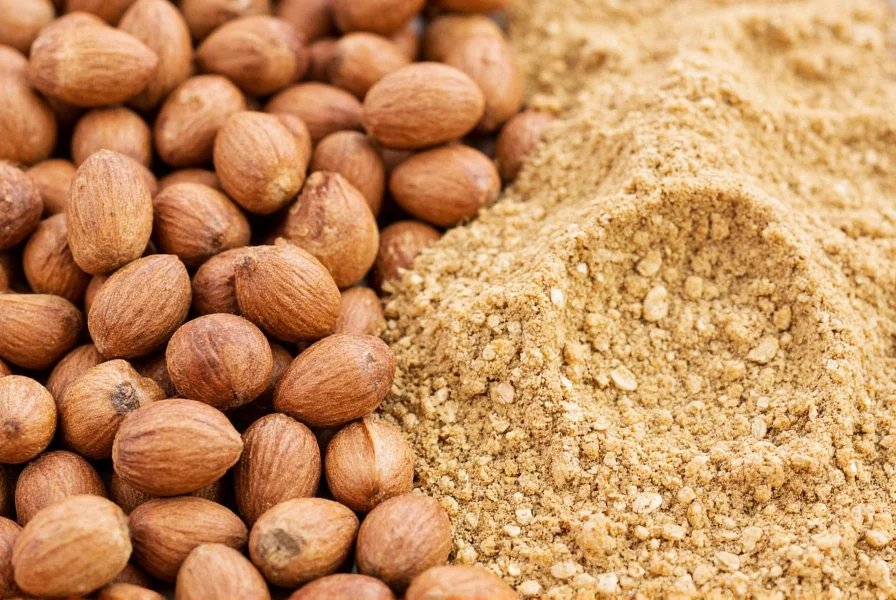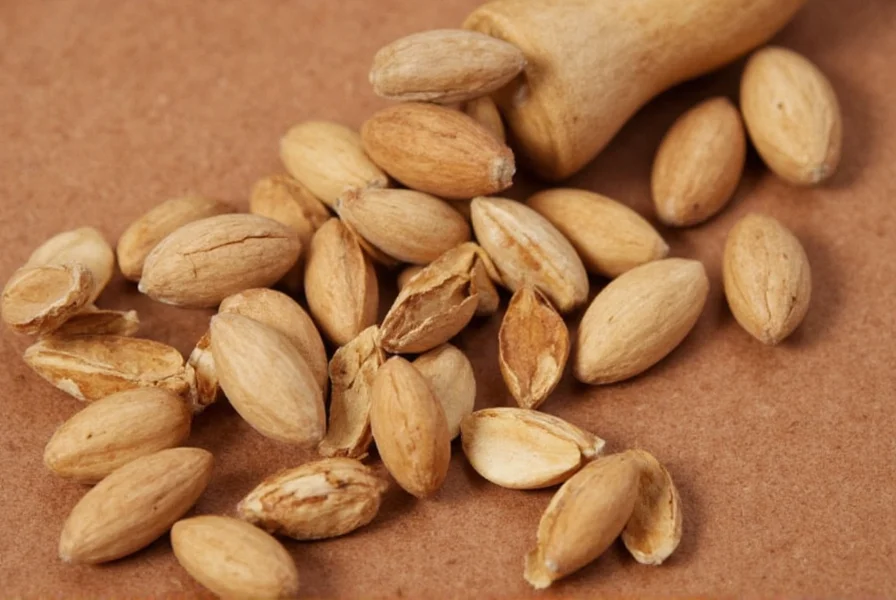Nutmeg, the seed of the Myristica fragrans tree, has been used for centuries in both cooking and traditional medicine. This aromatic spice brings more than just flavor to your dishes—it contains bioactive compounds with potential health benefits. Understanding the proper balance between its advantages and risks is essential for safe consumption.
Nutritional Profile of Nutmeg
Per teaspoon (2.1g) of ground nutmeg provides:
| Nutrient | Amount | % Daily Value |
|---|---|---|
| Calories | 12 | 1% |
| Fiber | 1g | 4% |
| Manganese | 0.2mg | 10% |
| Copper | 0.1mg | 11% |
| Magnesium | 10mg | 2% |
| Thiamine (B1) | 0.02mg | 2% |
Nutmeg's real value comes from its phytochemical composition rather than its basic nutrients. It contains significant amounts of:
- Myristicin - A compound with potential cognitive benefits at low doses but toxic at high levels
- Elemicin - Another psychoactive compound present in smaller amounts
- Terpenes - Including pinene and sabinene with anti-inflammatory properties
- Phenolic compounds - Powerful antioxidants that combat oxidative stress
Science-Backed Health Benefits of Nutmeg
Research suggests several potential health benefits when nutmeg is consumed in culinary amounts:
Digestive Support
Studies indicate nutmeg may help stimulate digestion and reduce symptoms of indigestion. A 2016 study published in the Journal of Ethnopharmacology found that nutmeg extract demonstrated significant anti-ulcer properties in animal models, suggesting potential benefits for gastrointestinal health.
Anti-Inflammatory Effects
The terpene compounds in nutmeg have demonstrated anti-inflammatory properties in laboratory studies. Research in the Journal of Agricultural and Food Chemistry showed that nutmeg extract inhibited inflammatory markers, which could potentially help with conditions like arthritis when consumed as part of a balanced diet.
Antioxidant Capacity
Nutmeg contains various phenolic compounds that act as antioxidants. According to a 2018 analysis in Food Chemistry, these compounds help neutralize free radicals that contribute to cellular damage and chronic disease development.
Potential Cognitive Benefits
Some preliminary research suggests that the myristicin in nutmeg might have neuroprotective effects. A study in Phytomedicine indicated that myristicin could potentially inhibit enzymes associated with cognitive decline, though more human research is needed to confirm these effects at culinary consumption levels.
Understanding Nutmeg Toxicity and Safety Concerns
While nutmeg offers benefits in small amounts, it contains myristicin which can be toxic at higher doses. Understanding the threshold for safe consumption is critical:
Symptoms of Nutmeg Overconsumption
Consuming more than 1-2 teaspoons of nutmeg can lead to:
- Severe nausea and vomiting
- Dry mouth and throat
- Increased heart rate (tachycardia)
- Visual and auditory hallucinations
- Anxiety and agitation
- Dizziness and confusion
- In extreme cases, seizures or organ damage
These effects typically begin 1-8 hours after consumption and can last up to 48 hours. The European Food Safety Authority notes that doses exceeding 10mg of myristicin (approximately 2-3 teaspoons of ground nutmeg) may cause adverse effects.
Who Should Limit Nutmeg Consumption
Certain populations should be particularly cautious with nutmeg:
- Pregnant women - High doses may stimulate uterine contractions
- Individuals with liver conditions - Myristicin is metabolized by the liver
- People taking certain medications - Nutmeg may interact with antidepressants and sedatives
- Those with bleeding disorders - Nutmeg may slow blood clotting

Practical Guidelines for Safe Nutmeg Consumption
To enjoy nutmeg's benefits while avoiding risks, follow these evidence-based recommendations:
Recommended Daily Amounts
For most adults, the safe daily consumption range is:
- Ground nutmeg: ¼ to ½ teaspoon (0.5-1g)
- Whole nutmeg: 1-2 small gratings
This amount provides potential health benefits without approaching toxic levels. Remember that nutmeg's flavor intensifies over time, so start with less and adjust to taste.
Better Ways to Incorporate Nutmeg
Maximize benefits while controlling portions:
- Grate fresh nutmeg over dishes just before serving for optimal flavor and nutrient retention
- Add to warm beverages like milk or tea (½ teaspoon maximum)
- Use in small amounts in vegetable dishes, especially squash and sweet potatoes
- Include in spice blends for meat rubs (combined with other spices to dilute concentration)
- Avoid using nutmeg in large quantities in baked goods where precise measurement is difficult
Storage Tips to Maintain Quality
To preserve nutmeg's beneficial compounds:
- Store whole nutmeg in an airtight container away from light and heat
- Ground nutmeg loses potency faster—use within 6 months for best quality
- Buy small quantities to ensure freshness
- Consider keeping whole nutmeg and grating as needed for maximum benefit

Conclusion: Is Nutmeg Good for You?
When used appropriately in culinary amounts, nutmeg can be a beneficial addition to your diet with antioxidant and anti-inflammatory properties. The key is moderation—sticking to ¼ to ½ teaspoon per day provides potential health benefits without risking the toxic effects associated with higher consumption. As with any spice, individual responses may vary, so pay attention to how your body reacts. For most people, incorporating small amounts of nutmeg into a balanced diet is both safe and potentially beneficial.
Frequently Asked Questions
How much nutmeg is safe to consume daily?
For most adults, ¼ to ½ teaspoon (0.5-1g) of ground nutmeg per day is considered safe. Consuming more than 1-2 teaspoons can lead to nutmeg toxicity with symptoms including nausea, rapid heartbeat, and hallucinations.
Can nutmeg cause hallucinations?
Yes, consuming large amounts of nutmeg (typically 2+ teaspoons) can cause hallucinations due to myristicin content. These effects usually begin 1-8 hours after consumption and can last up to 48 hours. This is why nutmeg should only be consumed in culinary amounts.
Is nutmeg good for digestion?
Research suggests nutmeg may support digestion in small amounts. Studies have shown potential anti-ulcer properties and digestive stimulation, but these benefits occur only at culinary doses (¼ to ½ teaspoon). Larger amounts can actually cause severe nausea and vomiting.
Can pregnant women eat nutmeg?
Pregnant women should limit nutmeg consumption to typical culinary amounts (¼ teaspoon or less). High doses may stimulate uterine contractions. While small amounts in food are generally considered safe, pregnant women should avoid medicinal doses or nutmeg supplements.
Does nutmeg interact with medications?
Yes, nutmeg may interact with certain medications including antidepressants (particularly MAOIs), sedatives, and blood thinners. The myristicin in nutmeg can enhance the effects of these medications. If you take prescription medications, consult your healthcare provider before consuming nutmeg in amounts larger than typical culinary use.











 浙公网安备
33010002000092号
浙公网安备
33010002000092号 浙B2-20120091-4
浙B2-20120091-4